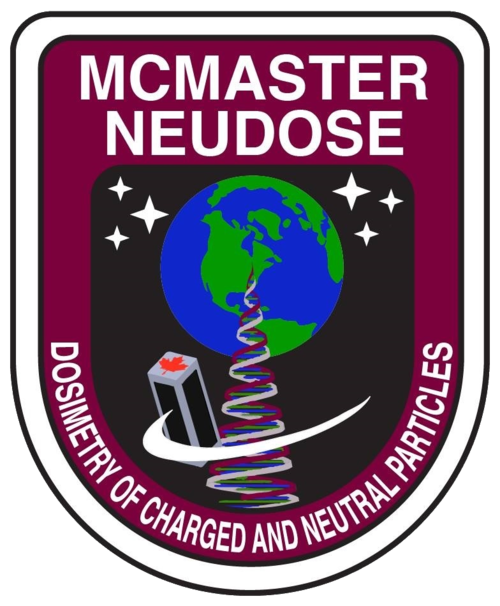Last week, Josip Zic, Sectional Manager at Ontario Power Generation and PhD Candidate in the Radiation Sciences Graduate Program at McMaster University, presented his comprehensive exam. His presentation outlined the radiation risk for a human mission to Mars. In his outline of radiation risk assessment, he spotlighted the work being done in our NEUDOSE mission. It was a great honour to be mentioned alongside other new and innovative methods for classifying and analyzing the hazards astronauts are exposed to during human space flight.
Mechanical Structure of the Entire Satellite
Pictured above is a photograph of the entire mechanical structure of the McMaster NEUDOSE satellite. The 10cm x 10cm x 30cm satellite is about the same size as a loaf of bread. Mounted inside the satellite is the Tissue Equivalent Proportional Counter (TEPC), a major component of the radiation detection system. The panels protruding from the aluminum body contain the solar panels that will convert solar energy to electrical energy for the satellite.
Thank you, McMaster Engineering Society!
McMaster NEUDOSE would like to thank the McMaster Engineering Society for providing funding to our team from their Special Projects Fund. This funding will be used in the design and construction of components for the ground station. The ground station will be the hub here on Earth that will be used to communicate with the satellite when it is out in space.
The McMaster Engineering Society has also given us support in the past, and we greatly appreciate their continuous support!
To learn more about the MES and our other supporters, click here.
Solar Panel Deployment Demonstration
This is a slow motion video of the solar panel deployment demonstrated at the McMaster NEUDOSE STARS event on November 10, 2016. The solar panels are held in using nichrome wire. When an appropriate current is applied to the wire, it will burn, allowing the solar panels to spring outward. These solar panels will convert energy from the sun to usable electricity for the satellite.
Support Us!
Want to support our project? McMaster NEUDOSE is accepting donations on our official McMaster University fundraising page. All donations will go directly to the launch of our satellite. If you would like to contribute, please click here! Donations through this page are eligible for a tax receipt. Thank you so much for your support!
Many Thanks to Altium!
McMaster NEUDOSE would like to thank our newest sponsor, Altium! Altium has provided NEUDOSE with software licenses that will allow us to thoroughly and completely design printed circuit boards for many of the components of the satellite. We look forward to making great strides in our progress with Altium!
To learn more about Altium and our other sponsors, click here.
STARS - Out of This World!
The McMaster NEUDOSE team would like to thank everyone that attended the STARS event. It was such a success and we had an incredible time sharing our progress with you all. Filled with interactive demonstrations and exciting visuals, we hope everyone was fully engaged and enjoyed their time with us. We look forward to continuing to share our progress with you!
To see photographs of the event, click here!
McMaster NEUDOSE STARS is One Day Away!
We are excited to announce that we will have McMaster NEUDOSE merchandise for sale at our tech show tomorrow! We will also be raffling off official NASA merchandise!
We hope to see you all there for exciting live demonstrations and visual simulations of technology designed and developed by McMaster students!
Thursday, November 10th
6:30pm
Burke Science Building 104
STARS: Satellite Team Aerospace Review Show
Want to see what we've been up to? Come out to McMaster NEUDOSE STARS: Satellite Team Aerospace Review! We will have exciting live demonstrations and engaging visuals of the various technologies we have designed and developed. This will also be a great opportunity to meet all the members of the team!
Thursday, November 10
6:30pm
BSB 104
We can't wait to see you there!
Movie Night Success!
The McMaster NEUDOSE Team.
The McMaster NEUDOSE team would like to thank everyone that attended the free movie night yesterday evening! We had a great time with notable attendees such as Dr. Bruce Milliken, Dean of Science, Dr. Michael Farquharson, Associate Dean of Science, Peter Ernst, Program Manager at CANDU Ownders Group, and Dr. Fiona McNeill, Director of the Radiation Sciences Graduate Program.
Dr. Soo Hyun Byun, one of our investigators, thanking Dean of Science Dr. Bruce Milliken for attending the event.
If you are interested in supporting our project, click here!













